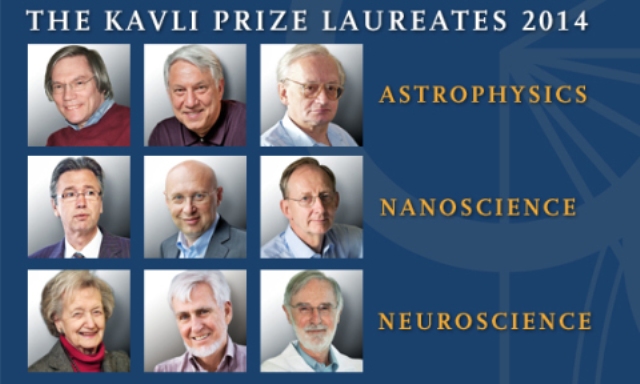May 30 2014
Nine pioneering scientists have been named this year's recipients of the Kavli Prizes -- prizes that recognize scientists for their seminal advances in astrophysics, nanoscience and neuroscience. This year's laureates were selected for pioneering the theory of cosmic inflation, for transformative contributions to the field of nano-optics and for the discovery of specialized brain networks for memory and cognition.
 Kavli Prize winners 2014
Kavli Prize winners 2014
The Kavli Prize is awarded by The Norwegian Academy of Science and Letters and consists of a cash award of 1 million US dollars in each field. The laureates receive in addition a gold medal and a scroll. Today's announcement was made by Nils Chr. Stenseth, President of The Norwegian Academy of Science and Letters, and transmitted live to New York as part of the opening event at the World Science Festival.
The Kavli Prize in Astrophysics is shared between Alan H. Guth, Massachusetts Institute of Technology, USA, Andrei D. Linde, Stanford University, USA, and Alexei A. Starobinsky, Landau Institute for Theoretical Physics, Russian Academy of Sciences, Russia. They receive the prize "for pioneering the theory of cosmic inflation". The theory of cosmic inflation, proposed and developed by the three prize winners, has revolutionized our thinking about the Universe.
According to this theory, very soon after our universe came into existence it underwent a short-lived phase of exponential expansion. During this brief period the universe expanded by a huge factor -- hence the name inflation. The consequences of this episode were momentous for the evolution of the cosmos.The field of inflation theory now occupies thousands of theorists, and many variations of inflation are being actively debated.
The Kavli Prize in Nanoscience is shared between Thomas W. Ebbesen, Université Louis Pasteur, Université de Strasbourg, France, Stefan W. Hell, Max Planck Institute for Biophysical Chemistry, Germany, and Sir John B. Pendry, Imperial College London, UK.
They receive the prize "for transformative contributions to the field of nano-optics that have broken long-held beliefs about the limitations of the resolution limits of optical microscopy and imaging".
With their respective work, they have challenged established beliefs about the resolution limits of optical imaging, showing that light can interact with nanostructures smaller than its wavelength.
Seeing at the 'nanoscale' was long considered to be limited in visible resolution by the finite wavelength of 'light', so that only objects larger than ~ 200 nanometers could be imaged. This is about 100 times smaller than the diameter of a human hair.
Each of this year's prize winners, through their different insights and routes, has independently advanced our ability to 'see' nanostructures using 'ordinary' light. This ability to see and image nanoscale objects is a critical prerequisite to further advances in the broader field of nanoscience.
The Kavli Prize in Neuroscience is shared between Brenda Milner, Montreal Neurological Institute, McGill University, Canada, John O'Keefe, University College London, UK, and Marcus E. Raichle, Washington University in St.Louis School of Medicine, USA. They receive the prize "for the discovery of specialized brain networks for memory and cognition".
The recipients of the Kavli Prize in Neuroscience have all played major roles in advancing our understanding of memory and in the development of techniques to measure the brain. They have discovered that these functions are produced by specialized systems in the brain, which they analysed through a variety of research approaches. They have found the specific regions of the brain that are involved in memory, and how specialized nerve cells perform different roles.
The higher cognitive functions of our brains such as attention, memory, and planning are crucial to create our rich mental lives: memory is essential for humans, from the recognition of where we are, through learning new skills, to being able to recall events. In humans memory can be said to define who we are, and we know that loss of memory can have devastating effects on an individual's personality. Knowing how memory function should work in healthy people could open the door to understanding what has changed in patients with dementia and memory loss.